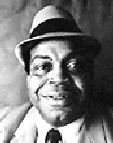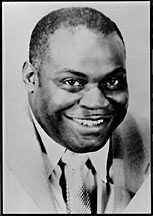 WILLIE DIXON
WILLIE DIXON 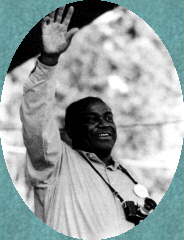
 WILLIE DIXON
WILLIE DIXON 
It was Leonard "Baby Doo" Caston who persuaded Dixon to abandon boxing
for a career in music. Caston provided Dixon with his first instrument,
a one string, tin-can bass. Jumping around between different
music groups in the Chicago area, Dixon finally settled with Bernardo Dennis
on guitar and Caston on piano to form the Big Three Trio in 1946. 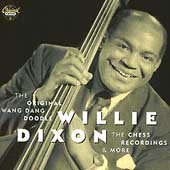 Ollie
Crawford, a cohort of Caston's from the Rhythm Rascals, replaced Caston
a year later. The Big Three, as they were known, toured the midwestern
network where they found moderate success. In his travels prior to
forming the trio, Dixon had gained studio experience with Lester Melrose,
a record company owner now with Okeh records. This relationship initially
atrracted the Chess brothers, who checked him out during jam sessions at
their club, Macamba. In November of 1948, Dixon played on a Robert
Nighthawk session, his first at Chess, still known as Aristocrat then.
Recording as his schedule permitted, he became a full time employee in
1951 producing, arranging, running the studio band and playing bass on
"everybody's everything." Leonard Chess described him as "my right
arm." (Snowden, 81)
Ollie
Crawford, a cohort of Caston's from the Rhythm Rascals, replaced Caston
a year later. The Big Three, as they were known, toured the midwestern
network where they found moderate success. In his travels prior to
forming the trio, Dixon had gained studio experience with Lester Melrose,
a record company owner now with Okeh records. This relationship initially
atrracted the Chess brothers, who checked him out during jam sessions at
their club, Macamba. In November of 1948, Dixon played on a Robert
Nighthawk session, his first at Chess, still known as Aristocrat then.
Recording as his schedule permitted, he became a full time employee in
1951 producing, arranging, running the studio band and playing bass on
"everybody's everything." Leonard Chess described him as "my right
arm." (Snowden, 81)
His first listed session for Chess Records, came in 1952 on Jimmy Roger's
"Back Door Friend." With the success of Muddy
Water's "Hoochie Coochie Man" in January of 1954, Leonard Chess was
convinced of the comercial possibility of Dixon's work. Dixon was
promoted to Artistic Director and began taking part in all recording sessions
at Chess Records. 1955 brought Little Walker's "My Babe," the first
Dixon song to top the R&B charts. His contributions were not
limited to the blues sphere, as he did the first session 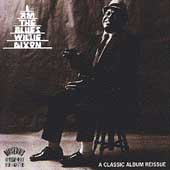 for
the El-Rays(later known as the Dells) in 1954, backing them with the Willie
Dixon Orchestra. With "Maybellene," also in 1955, Dixon began a long
standing relationship with Chuck Berry in the studio,
lasting virtually uniteruptred until the early 60s. During the 1950s
he also backed such phenomenal acts as Howlin' Wolf
and Elmore James, and in 1959 he performed with Memphis Slimm in New York
City. Modern Chicago blues owes him such classics as "My Babe," "Wang
Dang Doodle," and "Little Red Rooster."
for
the El-Rays(later known as the Dells) in 1954, backing them with the Willie
Dixon Orchestra. With "Maybellene," also in 1955, Dixon began a long
standing relationship with Chuck Berry in the studio,
lasting virtually uniteruptred until the early 60s. During the 1950s
he also backed such phenomenal acts as Howlin' Wolf
and Elmore James, and in 1959 he performed with Memphis Slimm in New York
City. Modern Chicago blues owes him such classics as "My Babe," "Wang
Dang Doodle," and "Little Red Rooster."
Dixon saw quite the unique side of Leonard Chess. Being in the position
he was, Dixon was able to see Chess not just as a man assisting bluesmen
of the South to record, but a bussinessman. Having its own publishing
wing, Arc Music, Chess Records was able to take advantage of its powers.
Frequently Chess added names on copyrights in order to retain more of the
royalties. Dixon comments on Leonard, "Frankly, Leonard was a maneuverer.
He was dealing with people who didn't know anything about the record business.
I call it swindling but most people call it smart business when you can
take advantage of someone who doesn't know better. I didn't know
anything about copyrights laws or anything like that." (Snowden, 99)
Dixon also relates stories of how Chess would allow musicians to have a
few drinks, sometimes to the point of being drunk, before negotiating
contracts with them. Of course, as Dixon says, "there weren't any
law that was forcing him to do all the things legitimate with black people."
(Snowden, 201) Regardless, Dixon served an important role in the
development of Chess Records, providing many artists with some of their
most popular songs. Later in his career, Dixon helped to bring blues
festivals to Europe, giving the blues an new international audience and
ultimately spreading blues around the world.
